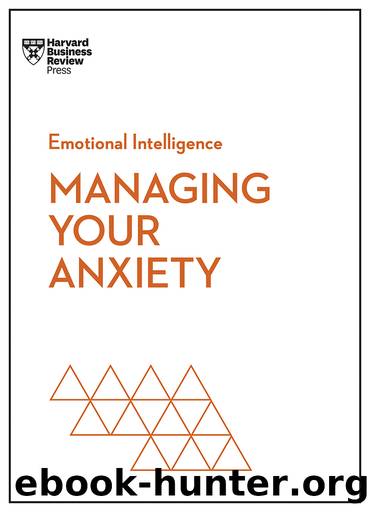Managing Your Anxiety by Harvard Business Review

Author:Harvard Business Review
Language: eng
Format: epub
Publisher: Harvard Business Review Press
Published: 2023-02-15T00:00:00+00:00
7
Use Gratitude to Counter Stress and Uncertainty
By Christopher Littlefield
Living in a constant state of uncertaintyâa pandemic, a looming recession, or layoffsâcan feel like running a race with no finish line or completing a puzzle without a reference picture. Everything seems unclear, and the worst seems possible.
Of course, this not a fun state of mind to be in. So what can we possibly do to help minimize the impacts of uncertainty on our well-being? While it may not address the root cause, research shows that gratitude can help balance us out.1
Why is gratitude important?
âGratitude is an emotion that grounds us and is a great way to balance out the negative mindset that uncertainty engenders,â said Dr. Guy Winch, author of the book Emotional First Aid. When we express gratitude, our brain releases dopamine and serotoninâtwo hormones that make us feel lighter and happier inside.
We experience gratitude when we shift our focus from what we donât have to what we do, and when we take time to appreciate and be thankful for those who have contributed to the abundance in our lives. Nearly a decade of research by Dr. Robert Emmonsâthe worldâs leading scientific expert on gratitudeâand others has found that people who have regular gratitude practices are healthier, are happier, and have better relationships. Further research suggests that gratitude is also key in helping individuals and teams persevere in challenging tasks.
Think of your mind like your digestive systemâwhat you put in it impacts how you feel. When you flood your mind with a constant flow of worry, envy, resentment, and self-criticism (compounded by a barrage of news and other media) it negatively impacts your mental well-being. A gratitude practice is like a workout and a healthy eating plan for your mind.
In his article âWhy Gratitude Is Good,â Emmons writes, âYou canât feel envious and grateful at the same time. Theyâre incompatible feelings, because if youâre grateful, you canât resent someone for owning things you donât.â He goes on to share his research, which found that people with high levels of gratitude have low levels of resentment and envy. (For more on these feelings, see the sidebar âThe Relationship Between Envy and Anxiety.â) When we take time to focus on what we are grateful for, we choose positive emotions over negative; thus, we take steps to nurture our mental health and well-being.
How do we trigger gratitude in ourselves? Itâs simple. We take time to shift our focus.
How to trigger gratitude in ourselves
Have you ever noticed that when you are looking to buy a new phone, jacket, or some other object all of a sudden everyone around you has it? Thatâs because, consciously or unconsciously, whatever we are focused on is what we see. If we want to trigger gratitude in ourselves, we need to intentionally shift our focus to that which we are grateful for. The simplest way to do this is through questions, prompts, and a few daily rituals.
THE RELATIONSHIP BETWEEN ENVY AND ANXIETY
By Nihar Chhaya
Envy and anxiety are a bit of a chicken-and-egg situation.
Download
This site does not store any files on its server. We only index and link to content provided by other sites. Please contact the content providers to delete copyright contents if any and email us, we'll remove relevant links or contents immediately.
Should I Stay or Should I Go? by Ramani Durvasula(7639)
Why We Sleep: Unlocking the Power of Sleep and Dreams by Matthew Walker(6684)
Fear by Osho(4722)
Flow by Mihaly Csikszentmihalyi(4666)
Rising Strong by Brene Brown(4431)
Why We Sleep by Matthew Walker(4420)
The Hacking of the American Mind by Robert H. Lustig(4355)
How to Change Your Mind by Michael Pollan(4338)
Too Much and Not the Mood by Durga Chew-Bose(4319)
Lost Connections by Johann Hari(4161)
He's Just Not That Into You by Greg Behrendt & Liz Tuccillo(3872)
Evolve Your Brain by Joe Dispenza(3651)
The Courage to Be Disliked by Ichiro Kishimi & Fumitake Koga(3469)
Crazy Is My Superpower by A.J. Mendez Brooks(3379)
In Cold Blood by Truman Capote(3365)
Resisting Happiness by Matthew Kelly(3331)
What If This Were Enough? by Heather Havrilesky(3297)
The Book of Human Emotions by Tiffany Watt Smith(3282)
Descartes' Error by Antonio Damasio(3262)
